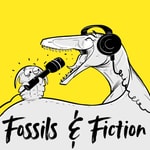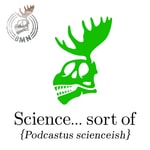Palaeocast – Détails, épisodes et analyse
Détails du podcast
Informations techniques et générales issues du flux RSS du podcast.

Palaeocast
Palaeocast
Fréquence : 1 épisode/20j. Total Éps: 233

Classements récents
Dernières positions dans les classements Apple Podcasts et Spotify.
Apple Podcasts
🇬🇧 Grande Bretagne - naturalSciences
02/08/2025#48🇬🇧 Grande Bretagne - naturalSciences
01/08/2025#72🇫🇷 France - naturalSciences
01/08/2025#97🇬🇧 Grande Bretagne - naturalSciences
31/07/2025#64🇺🇸 États-Unis - naturalSciences
31/07/2025#90🇫🇷 France - naturalSciences
31/07/2025#82🇬🇧 Grande Bretagne - naturalSciences
30/07/2025#49🇫🇷 France - naturalSciences
30/07/2025#98🇬🇧 Grande Bretagne - naturalSciences
29/07/2025#35🇩🇪 Allemagne - naturalSciences
29/07/2025#94
Spotify
Aucun classement récent disponible
Liens partagés entre épisodes et podcasts
Liens présents dans les descriptions d'épisodes et autres podcasts les utilisant également.
See all- http://www.ucd.ie/
5 partages
Qualité et score du flux RSS
Évaluation technique de la qualité et de la structure du flux RSS.
See allScore global : 43%
Historique des publications
Répartition mensuelle des publications d'épisodes au fil des années.
Episode 162: Cerney Wick
Épisode 162
mardi 23 juillet 2024 • Durée 01:29:36
Episode 161: Notosuchians
Épisode 161
samedi 15 juin 2024 • Durée 49:17
Found in the fossil record between the Jurassic and the middle Miocene, Notosuchia was a highly diverse and strange group of crocodylomorphs, most notable for their terrestrial lifestyle.
Joining us for today’s episode is Dr Yohan Pochat-Cottilloux from the Laboratoire de Géologie de Lyon, who specialises in the study of crocodylomorphs. Together, we will explore the wide range of scientific methodologies that have so far been used to study the lives of these strange reptiles and discuss how they may have looked and behaved.
Life On Our Planet 8.1 - Introduction
jeudi 9 novembre 2023 • Durée 13:57
LOOP 8.1: Dave and Tom introduce episode 8 and round of this special series on Life On Our Planet. We talk about our favourite scenes and reflect on our time working on the documentary and how our perspectives of documentary making has changed. We’d love your feedback on this podcast series.
Life On Our Planet (LOOP) is a new 8-part series created for Netflix by Silverback Films and Amblin Television. This Steven Spielberg produced series, narrated by Morgan Freeman, is hugely ambitious in its scope, telling the story of life throughout the whole Phanerozoic Eon. Ancient organisms and environments are painstakingly recreated by the supremely talented Industrial Light and Magic, whilst modern natural history scenes add vital context to the story.
This show has been worked on for six years, during which time countless papers were read and around 150 different palaeontologists contributed their time and knowledge. The whole production had culture of letting the scientific rese arch dictate scenes, resulting in one of the most accurate on-screen representations of prehistoric life there has ever been.
And how do we know all this? Well, our very own team members Tom Fletcher and Dave Marshall have been embedded within the LOOP team since day one! We are therefore in a totally unique position to reveal to you the work that went into this series, from both the production and research side of things.
In this unofficial series, we’ve been granted exclusive access to many of the people responsible for creating LOOP, we explore what it takes to create a palaeontological documentary and we delve deeper into the science with some of the show’s academic advisors. Each day, we will be releasing batches of interviews, each relating to a specific episode of LOOP.
Image courtesy and copyright of Netflix.
Episode 95: Plants and Atmosphere
Épisode 95
mardi 16 octobre 2018 • Durée 27:35
The interaction between plants and atmosphere forms the basis of the carbon cycle and is amongst the most important processes for maintaining life on the planet today. Photosynthesis removes carbon dioxide from the atmosphere and in return forms the base of the food chain and produces the oxygen we, as animals, need to breathe. Equally, the composition of the atmosphere influences the climate and thus the availability of resources, governing where plants are able to survive.
The relationship between the two can be committed to the fossil record by such physical proxies as the number of stomata in leaves and by the palaeolattitude of different species. Other chemical proxies, such as isotopic ratios, can also help elucidate what the atmosphere was like at the time a plant was preserved. Similarly, atmospheric proxies can also be used to make inferences about past plant life in the absence of fossil remains.
Joining us to discuss the link between plants and atmosphere is Prof. Jennifer McElwain of Trinity College Dublin, Ireland.
Episode 94: Joggins Fossil Cliffs
Épisode 94
lundi 17 septembre 2018 • Durée 39:03
The Carboniferous was a time of huge swampy forests, big trees, and lots of life both on land and in the ocean. One world-renowned fossil site from approximately 300 million years ago is the Joggins Fossil Cliffs, located on the Bay of Fundy in Nova Scotia Canada. Joggins is one of Canada’s five palaeontology-based UNESCO World Heritage Sites, and is one of the best places in this world to find fossils from this time period.
Why are the Joggins Fossil Cliffs so important? What makes this locality unique?
In this episode, Liz speaks with Dr. Melissa Grey, the curator at the Joggins Fossil Centre to learn more about why this region is so important. We discuss the variety of fossils, from plants to invertebrates to vertebrates, and how the interesting preservation has resulted in virtually an entire ecosystem being preserved.
Episode 93: The History of Palaeontological Outreach
Épisode 93
dimanche 12 août 2018 • Durée 42:52
Palaeontology has an ability to grab the public’s attention like no other subject. Perhaps it’s the size and ferocity of something like a T. rex, or maybe it’s the alien nature of something like Hallucigenia. Irrespective of whatever it is that makes the subject interesting to any given individual, it’s important because palaeontology is a great gateway into STEM subjects and is, in itself, one of the few ways in which we can understand about the evolution of life and the planet.
But how has the public’s perception of palaeontology changed with the times? Was it more popular in its infancy, when huge questions were still left unanswered, or is it more popular now, in the era of Jurassic Park, where animatronics and CGI can bring fossils ‘back to life’?
Joining us to discuss how palaeontological outreach has been conducted and received throughout its history is Dr Chris Manias, King’s College London. Chris is a historian of palaeontology and founder of the ‘Popularizing Palaeontology‘, a network of scholars, scientists, museum professionals, artists, etc. who reflect on trends in palaeontological communication and build future collaborations.
The Expedition: Context
dimanche 1 juillet 2018 • Durée 42:13
Welcome to this special series of podcasts relating to a fieldtrip that I have been invited on by Dr Martin Brazeau of Imperial College London.
I’m being flown out as the Palaeozoic arthropod “expert” of the team and I’ll be there to deal with all the eurypterids and phyllocaridids we come across, along as documenting the whole process for outreach and hopefully your enjoyment.
In all, this trip will last around 6 weeks, during which time I’ll have no internet, electricity, running water or even any toilets. It’s going to be a gruelling trip, but hopefully one that will give you an insight into what life is like in the field. You will join us as we discuss the science, prepare for the trip, arrive in the field, go out digging and finally wrap things up. You will experience all the highs of discovering new and exciting fossils and the lows of when we’ve just all had enough. This expedition is a unique opportunity to share with you a single research project from start to finish, rather than just the results.
In this first episode, we contextualise why we’re going into the field. What is the current lay of the research landscape? What we already know? and what are we aiming to find out about the early evolution of the jawed vertebrates, a group to which we ourselves belong?
The Expedition: Planning
dimanche 1 juillet 2018 • Durée 39:00
Welcome to this special series of podcasts relating to a fieldtrip that I have been invited on by Dr Martin Brazeau of Imperial College London.
I’m being flown out as the Palaeozoic arthropod “expert” of the team and I’ll be there to deal with all the eurypterids and phyllocaridids we come across, along as documenting the whole process for outreach and hopefully your enjoyment.
In all, this trip will last around 6 weeks, during which time I’ll have no internet, electricity, running water or even any toilets. It’s going to be a gruelling trip, but hopefully one that will give you an insight into what life is like in the field. You will join us as we discuss the science, prepare for the trip, arrive in the field, go out digging and finally wrap things up. You will experience all the highs of discovering new and exciting fossils and the lows of when we’ve just all had enough. This expedition is a unique opportunity to share with you a single research project from start to finish, rather than just the results.
We now move on to discussing the logistics of the trip. How do you go about making this kind of expedition happen? What are some of the challenges we will face? What will life be like in the camp? and how will we get our priceless fossils home?
Episode 92: Squamate Origins
Épisode 92
mercredi 30 mai 2018 • Durée 49:00
Squamates are a group of reptiles that include lizards and snakes, with the earliest fossils occurring in the Jurassic, despite molecular studies dating the group back to the Triassic. The study of their origins has been contentious because of this gap, and the lack of fossils during this time period.
However, a new look at a previously-known fossil has changed our view of squamate origins, and discussing this animal and what it means about reptile relationships and squamates is Dr. Tiago Simões of the University of Alberta. This episode is based on a new paper published in Nature by Dr. Simões and colleagues.
Episode 91: Dinosaurs of Appalachia
Épisode 91
jeudi 24 mai 2018 • Durée 45:25
The Appalachian mountains, span the Eastern margin of the United States of America. They are predominantly composed of Paleozoic rocks, but Mesozoic marine sediments (formed adjacent to the Appalachian continent at the time) can be found along the Eastern coast. It is within these deposits that the remains of a unique dinosaur fauna can be found.
Joining us to paint a picture of the vertebrate faunas of Appalachia during the Mesozoic is Chase Brownstein, research associate at the Stamford Museum and Nature Centre.






